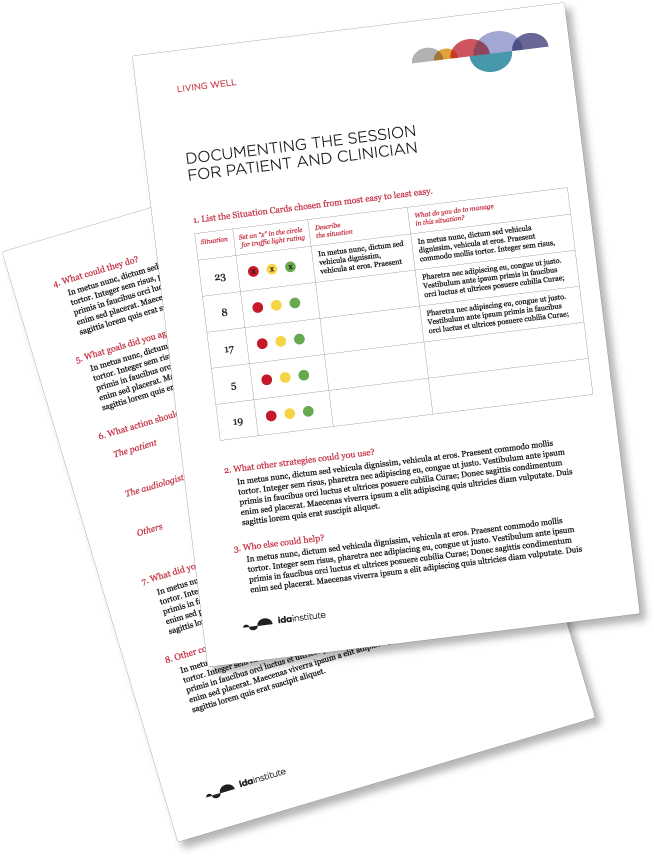Nærum, Denmark October 25 – Since 2016, the Ida Institute Research Committee has awarded research grants to projects that investigate the outcomes of using Ida Institute methods and tools and develop evidence to show the effect of person-centered hearing care. The first grant recipients have now submitted their reports. Their findings add to a growing body of evidence that demonstrates the value of Ida Institute methods and tools and the use of person-centered care in clinical practice.
Read more about our grant recipients at idainstitute.com/what_we_do/research_grants
Living Well Tool Creates Patient-Centered Framework
Project: Researchers explored the way audiologists convey information about communication and hearing loss management in appointments with adults with hearing loss and their communication partners.
Ida Tool: Living Well idainstitute.com/tools/living_well
The study found that using the Ida Living Well tool shifted the emphasis in appointments away from difficulties of living with hearing loss to more positive and proactive communication and lifestyle decisions.
The audiologists who participated in the study found that the Living Well tool was a helpful, easy-to-use tool, particularly at the start of the session where it provided context that helped to determine client goals. Clients described the Living Well tool as a good starting point for appointments that allowed them to fast-track discussion and spend valuable time on one-on-one problem solving with the clinician. Researchers concluded that the tool enabled them to move the appointment focus beyond the deficit model in audiological rehabilitation to more positive aspects of hearing loss management, such as social engagement and successful communication.
Lead Researcher: Dr. Nerina Scarinci, The University of Queensland
Co-Investigators: Dr. Carly Meyer, The University of Queensland, Dr. Katie Ekberg, The University of Queensland and Dr. Christopher Lind, Flinders University
Readiness for Rehabilitation
Project: Researchers examined how incorporating the Ida Motivation Tools into initial assessment appointments with adult clients can help audiologists better identify clients’ readiness for hearing rehabilitation.
Ida Tools: Motivation tools idainstitute.com/tools/motivation_tools
Audiologists in the study who used the tools improved their ability to identify their clients’ stages in the patient journey and successfully solicited clients’ readiness for rehabilitation and potential concerns regarding hearing aids. The findings emphasized the importance of the discussion that is initiated by using the tools and not relying solely on the clients’ scores. Evaluating only on the client’s scores can lead practitioners to over-estimate clients’ readiness. These study findings support the overall aim of the Motivational Tools as “conversation starters” and reinforced the need for audiologists to actively listen to clients’ responses.
Lead Researcher: Dr. Katie Ekberg, The University of Queensland
Co-Investigator: Dr. Caitlin Barr, The University of Melbourne
Ototoxic Hearing Loss Among Childhood Cancer Survivors
Project: Researchers explored the support needs of childhood cancer survivors and their parents during the hearing rehabilitation process.
Parents whose children acquire hearing loss through cancer treatment must deal with the stress of both cancer and hearing loss. Many of the children will need hearing aids and special support to help their language and speech skills develop. Their parents will need support to provide an environment that encourages listening, speech and language skills.
In the study, parents, teachers, and audiologists all described the intense emotional demands on both parents and children. They also noted a frequent misunderstanding by parents of the far-reaching impact of hearing loss on their child’s wellbeing. Both teachers and audiologists acknowledged the families’ need for support of all kinds, but primarily social-emotional support to facilitate family adjustment. The researchers determined that audiologists and teachers of deaf and hard-of-hearing children need both person-centered and family-centered awareness and skills and are well positioned to provide limited but important support through collaboration and consistency.
Lead Researcher: Dr. Janet Jamieson, The University of British Columbia
Co-Investigators: Beth Brooks, MSc RAUD and Dr. Marla Buchanan, The University of
British Columbia
Ida Institute Tools
The Ida Institute offers a range of tools that allows clinicians to open communication with their clients and gain a better understanding of their needs and wants. The tools and resources are freely available from the Ida Institute’s website. Read more at idainstitute.com and subscribe to the Ida Institute’s Weekly News for regular news updates from Ida Institute. You can also follow the Ida Institute on Twitter at @idainstitute, facebook.com/idainstitute or linkedin.com/company/ida-institute


